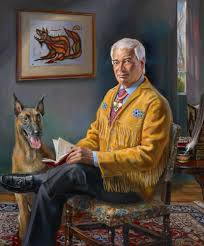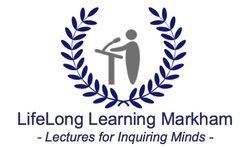
From the Backwoods of Muskoka to the Lieutenant Governor’s Office at Queen’s Park
James’ talk will cover his early years in Muskoka, key issues he dealt with in 35 years in the foreign service, the priority he accorded to the forgotten children as lieutenant governor, and utilizing the power of the pen to write social justice novels in the past decade.
The Honourable James K. Bartleman concluded his term as the 27th Lieutenant Governor of Ontario on 5 September 2007. During his time in office, Mr. Bartleman pursued three priorities: eliminating the stigma of mental illness, supporting anti-racism initiatives, and encouraging Aboriginal young people. As Lieutenant Governor, Mr. Bartleman implemented four aboriginal literacy programs including The Club Amick Reading Program for 5,000 native children and 36 summer reading camps for 2,500 children in Ontario’s north.
Preceding his appointment as Ontario’s Vice-Regal Representative, Mr. Bartleman served 35 years in Canada’s Foreign Service as ambassador to Cuba, Israel, NATO, and the European Union, and as high commissioner to South Africa and Australia. He was the foreign and defence policy advisor to the prime minister. Mr. Bartleman holds thirteen honorary degrees and is the recipient of a number of honours and awards, including the National Aboriginal Achievement Award 1999, the Phi Delta Kappa Educator of the Year Award 2004, and the Arthur Kroeger College Award in Ethics in Public Affairs 2007. Mr. Bartleman is an officer of the Order of Canada and a member of the Order of Ontario.
Mr. Bartleman is the author of four books of nonfiction. His novel As Long as the Rivers Flow speaks of the intergenerational effects of the residential school experience and is now being adopted in high schools. He is a former chancellor of The Ontario College of Art and Design, a former member of the Blue Ribbon Panel on the future of Medical Education in Canada, and a former visiting fellow to Laurentian University’s Aboriginal Studies Program. He is honorary patron to a number of organizations and causes.
James Bartleman was born in Orillia, Ontario and grew up in Port Carling. He is a member of the Chippewas of Rama First Nation.

Apr. 8 – Alan Mallory – Speaker, Author and Adventurer



Climbing Mt. Everest
Apr. 15 – Brian Carwana, Director, Encounter World Religions Centre

To See, To Be, To Do: The Landscape of World Religions
Apr. 29 – Dr. Michael Johns, Chair and Associate Professor of Political Science, Laurentian University

After Brexit: the UK and EU Step Into the Unknown
Dr. Michael Johns is Chair and Associate Professor of Political Science at Laurentian University in Sudbury, Ontario. His research focuses on issues of social cohesion in the European Union with particular interests in intra-EU migration and minority rights after Brexit. In 2014, he published The New Minorities of Europe: Social Cohesion in the European Union with Lexington Press; and in 2016 he co-edited The Return of the Cold War: Ukraine, the West and Russia, (Routledge) with J.L.Black. His doctorate is from the University of Maryland and he holds a MSc. in Comparative Politics from the London School of Economics.
May 6 – Dr. Charles Burton, Associate Professor, Brock University

Canada/China Relations and Free Trade
Canada’s political and business élite is strongly supportive of greatly enhanced economic integration with China through negotiation of a free trade agreement. Canadian public opinion is less supportive due to concerns about China’s corrupt politics and business culture, and perceived lack of respect for environmental and labour regulations as well as strong objections to pervasive violation of human rights in China.
There have been concerns raised about Chinese régime operations to further China’s political and economic interests in Canada through indirect provision of economic and other benefits to Canadian policymakers. Transfer of Canadian intellectual property and technologies to China is too often by espionage or other covert, coercive and corrupt means. This combined with increasing evidence of China’s unfair trading and investment practices with our allies New Zealand and Australia have made Chinese state enterprises’ acquisition of Canadian businesses (especially in the mining, energy and telecommunications and other infrastructure sectors) the subject of considerable controversy.
China has made enhanced economic engagement with Canada conditional on Canada ceasing to politically engage with China on human rights, and on other sensitive international issues such as China’s support for North Korea and China’s illegal development of military bases on islands in the South China Sea.
Ultimately the issue is whether Canada’s economic integration with China to sustain and promote Canadian economic prosperity in the face of uncertainty over relations with the United States necessarily comes at too great a political cost to Canada.
Dr. Charles Burton is an Associate Professor at Brock University specializing in Comparative Politics, Government and Politics of China, Canada-China Relations and Human Rights. He served as Counsellor at the Canadian Embassy to China between 1991-1993 and 1998-2000. Prior to coming to Brock worked at the Communications Security Establishment of the Department of National Defence. He received his PhD in 1987 from the University of Toronto after studies at Cambridge University (Oriental Studies) and Fudan University (History of Ancient Chinese Thought Program, Department of Philosophy, class of ’77). He was a Izaak Walton Killam Memorial Post-Doctoral Scholar in Political Science at University of Alberta, 1986-88.
He has published extensively on Chinese and North Korean affairs and Canada-China relations and has been commissioned to write reports on matters relating to Canada’s relations with China for agencies of the Government of Canada. He is a frequent commentator on Chinese affairs in newspapers, radio and TV.
